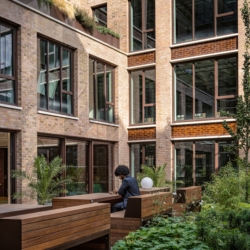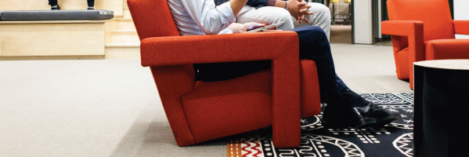To provide the best experiences, we use technologies like cookies to store and/or access device information. Consenting to these technologies will allow us to process data such as browsing behaviour or unique IDs on this site. Not consenting or withdrawing consent, may adversely affect certain features and functions.
The technical storage or access is strictly necessary for the legitimate purpose of enabling the use of a specific service explicitly requested by the subscriber or user, or for the sole purpose of carrying out the transmission of a communication over an electronic communications network.
The technical storage or access is necessary for the legitimate purpose of storing preferences that are not requested by the subscriber or user.
The technical storage or access that is used exclusively for statistical purposes.
The technical storage or access that is used exclusively for anonymous statistical purposes. Without a subpoena, voluntary compliance on the part of your Internet Service Provider, or additional records from a third party, information stored or retrieved for this purpose alone cannot usually be used to identify you.
The technical storage or access is required to create user profiles to send advertising, or to track the user on a website or across several websites for similar marketing purposes.
 The latest annual Workplace Trends Report from workplace services provider Sodexo claims to reveal the crucial role the built environment has in organisational performance. The report emphasises the growing strategic role of facilities management and the importance of sustainability as an element of corporate culture as well as a trend toward designing offices to attract and retain top talent by emphasising productivity and quality of life. The report also identifies the importance of social media in attracting prospective employees instead of traditional e-mail campaigns and other media.
The latest annual Workplace Trends Report from workplace services provider Sodexo claims to reveal the crucial role the built environment has in organisational performance. The report emphasises the growing strategic role of facilities management and the importance of sustainability as an element of corporate culture as well as a trend toward designing offices to attract and retain top talent by emphasising productivity and quality of life. The report also identifies the importance of social media in attracting prospective employees instead of traditional e-mail campaigns and other media.










 The first Omnirama event on the 23rd of March launched the series exploring different factors challenging the world of work in a time of prevailing uncertainty. Underlying Ominirama’s raison d’etre is that recent events have turned the status quo on its head with some major structural and systemic changes taking place. Nobody seems to have any clear idea of how to deal with this enormous transformation in the ways we work All the playbooks and all the guidance that we have all relied upon for so many years have now gone out the window.
The first Omnirama event on the 23rd of March launched the series exploring different factors challenging the world of work in a time of prevailing uncertainty. Underlying Ominirama’s raison d’etre is that recent events have turned the status quo on its head with some major structural and systemic changes taking place. Nobody seems to have any clear idea of how to deal with this enormous transformation in the ways we work All the playbooks and all the guidance that we have all relied upon for so many years have now gone out the window. 






 Since offices reopened, there has naturally been a much greater focus on health and safety. Office managers everywhere have deployed one-way corridors, anti-viral disinfectant wipes, and daily temperature checks in order to ensure that those who have returned to the office feel safe. Globally, businesses have learned to cope with these adverse circumstances, but there are other lessons from the past year that we should use to refresh the workplace as well.
Since offices reopened, there has naturally been a much greater focus on health and safety. Office managers everywhere have deployed one-way corridors, anti-viral disinfectant wipes, and daily temperature checks in order to ensure that those who have returned to the office feel safe. Globally, businesses have learned to cope with these adverse circumstances, but there are other lessons from the past year that we should use to refresh the workplace as well. 
 Today, companies cannot shy away from their responsibilities towards the environment. With Extinction Rebellion keeping the climate crisis firmly on the news agenda, and COP26 in November gathering more international attention than ever, how businesses approach and champion sustainability is under significant scrutiny. At a local level, organisations are being set targets by the UK government to commit to
Today, companies cannot shy away from their responsibilities towards the environment. With Extinction Rebellion keeping the climate crisis firmly on the news agenda, and COP26 in November gathering more international attention than ever, how businesses approach and champion sustainability is under significant scrutiny. At a local level, organisations are being set targets by the UK government to commit to 







August 22, 2023
Advancing accessibility and reaping the rewards of disability inclusion
by Katy Talikowska • Comment, Facilities management, Workplace design